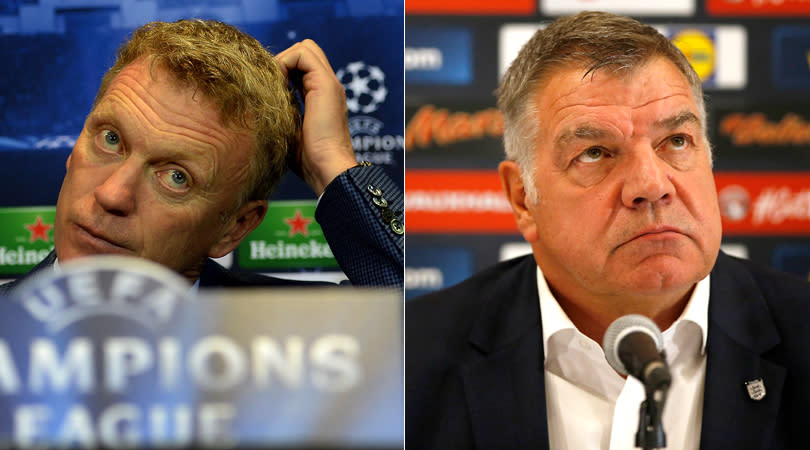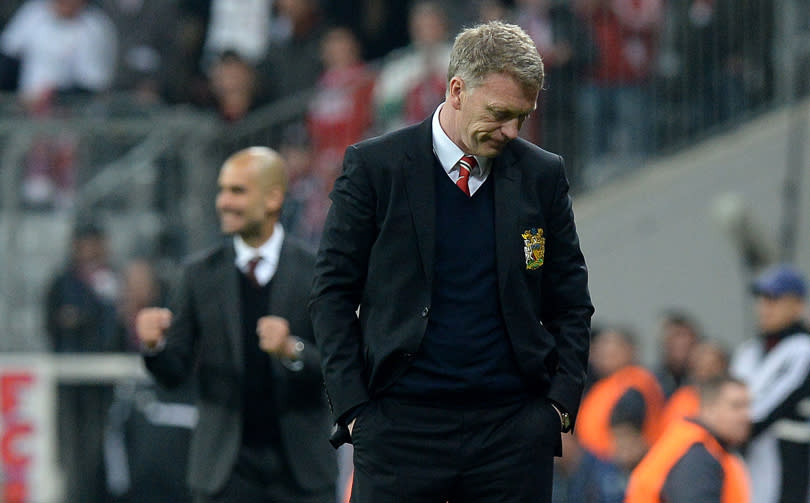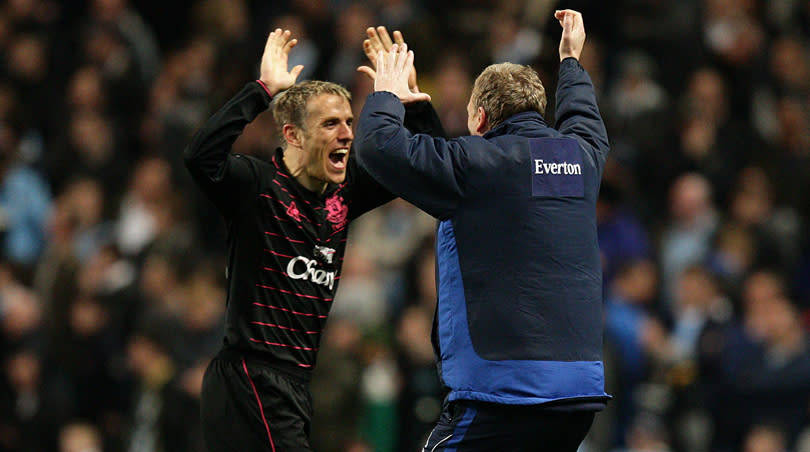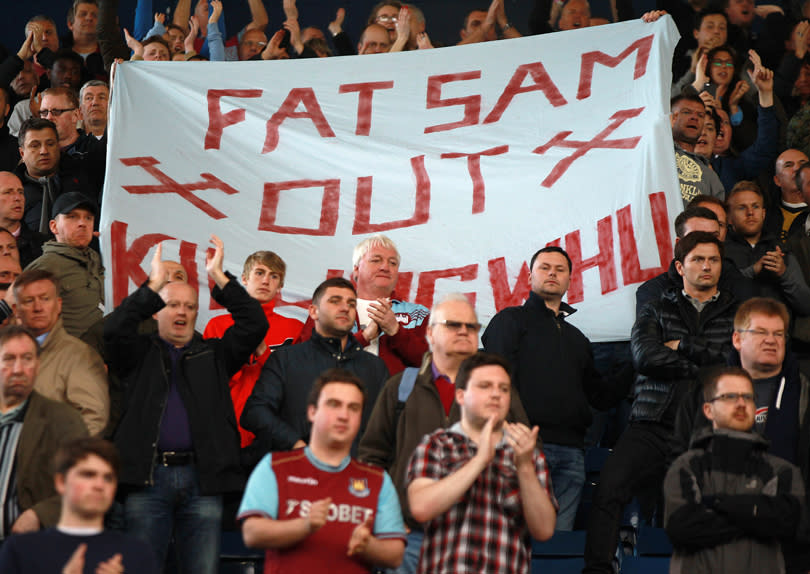David Moyes and Big Sam: broken by dream jobs, or are their struggles just coincidence?
Those of you who like your modern-day Greek myths to come in pairs (who doesn’t?) need look no further than the current Premier League table, which reveals not just one contemporary Icarus tale, but two. Things may change between now and May, but the gurgling depths of the division are currently swallowing two managers who were recently soaring gleefully to untold heights.
Rock bottom of the division sits David Moyes, who not long ago was being ushered into the most prestigious job in world football, hand-picked to succeed the greatest manager in the history of the sport.
Having spent a decade in the Premier League’s middle regions, he had been bequeathed a champion team by a champion coach, and it’s fair to presume he did not foresee himself, four years on, in the thick of a relegation dogfight tasked with conjuring competence out of Papy Djilobodji.
One place above him is Sam Allardyce. Seven months ago he too was being handed the job he had spent a career pining after. “It’s no secret that this is the role I have always wanted,” said Allardyce upon being named England coach. Two months later he underwent perhaps the most ignominious sacking in the national team’s history – which, make no mistake, is a hell of an achievement.
No way back
On the one hand Moyes and Allardyce should be commended for their rapid return to work in the wake of chastening public catastrophe. Rather than holing up in a darkened room with a bottle of scotch, leaving drunken voicemails for Ed Woodward and Martin Glenn and refusing to face the outside world, the pair have simply dusted themselves off and clambered nobly back onto the managerial ladder.
On the other hand, their desperate recent struggles suggest that those catastrophes – as personal catastrophes tend to do – have left an indelible mark.
Being brutal, the fact of the matter is that neither of their reputations will ever truly recover. Even if Moyes was to engineer the most remarkable escape from relegation of all time, the history books will have him down first and foremost as Fergie’s failed successor. The profile of the episode dictates it.
Allardyce could do the same with Palace and yet forever be remembered as the man who lasted 67 days in the England job, sacked after one game for eyeing up extracurricular income. Like Jamie Pollock and the Decca Records executive who passed up the chance to sign the Beatles, Moyes and Allardyce will always be defined by that one moment of maximum ineptitude.
New York, New York
Moyes's response to Sunderland's latest capitulation was to whisk them off to the sub-zero environs of New York, explaining that "the psychology behind going somewhere so cold is that when we come back we’ll think Sunderland is Dubai".
Hardly Sigmund Freud, you might think, but then at this stage maybe there’s not much to be read into Sunderland’s dreadfulness: sometimes a cigar is just a cigar. They are quite simply very bad indeed, and perhaps the best thing for the Scot’s squad is to be removed entirely from their usual surroundings. After all, what the perennially doomed club really need is not, as the cliche goes, to “rediscover their identity”, but to shed it completely.
Moyes himself, on the other hand, does need to relocate a side of himself that's been absent ever since he left Goodison Park. Quite what that quality could be termed is harder to describe: from the outside looking in, Moyes's basic persona has remained broadly the same – patient, diligent, generally a good egg – but since that fateful summer of 2013 he has worn a haunted, haggard look. Tenacity has become tentativeness, conviction has become unease.
It's hard to escape the idea that something fundamental changed once his dream job began to play out as a living nightmare.
For so long an up-and-coming innovator, Moyes’s year in charge of Real Sociedad gave the impression of a man desperately short of ideas and his actions as Sunderland boss have done little to dispel that image. In what could be read as a tragically literal attempt to rediscover the managerial magic of yesteryear, a man who was once a canny operator in the transfer market has simply re-hired a job lot of his old players: seven of his 10 signings so far have worked under him before.
It's a policy that is a transparent attempt to retrieve his own excellence, yet simultaneously demonstrates a refusal to take the very risks that – through leftfield, imaginative signings like Tim Cahill and Phil Jagielka – led to that excellence in the first place.
To put it another way: the David Moyes of old would never have gone after the Joleon Lescott of today. The fact that Victor Anichebe, Jack Rodwell and Steven Pienaar all accompanied Moyes to the Big Apple as Everton players six years ago hardly screams innovation from a man whose reputation is in desperate need of a revamp.
Out of place
Allardyce's own plans for a mid-season expedition – to Dubai – failed to get off the ground amid a discontented winter at Palace, so the team that has failed to score in seven of the 11 games under their new manager will need to find inspiration in familiar surroundings.
Typecast these days as a specialist jailbreaker, Allardyce's struggles in south London have come as a surprise, although perhaps they shouldn't: the man from Dudley has always seemed out of place in the capital. Like his playing career, much of which reads as a A-Z of the working-class north, his managerial style has been best served by the ruggedness of England's provinces, while his two excursions to the capital have brought conflict and calamity.
His stint at West Ham came to a sour end as soon as the Midlander's unapologetic pragmatism began to jar with the East Enders' dapper self-image, and his time in office at Wembley was terminated due to transgressions that fell out of sync with the FA's self-appointed role as bastions of purity.
Palace may lack the pretensions of Allardyce's previous London-based employers, but that aside, his first two months in charge of the club read like another chapter of a culture clash that's only ever ended badly in the past.
In that sense, the failure in his dream job may be less the cause of his current struggles than simply a more glaring symptom of the same disorder. Moyes’s woes perhaps stem more directly from what came before. Both cases, though, beg the question of motivation: where do you look for inspiration once you’ve mucked up your one chance at the big time?
Modified expectations
It would be crude – and wildly speculative – to conclude that both managers suddenly lack any motivation on account of one sacking. But equally, it’s impossible to deny that the prospect of soaring upward mobility no longer exists for either, that the best they can hope for now is a revival of the days of mid-table stability – a time when they were, in turn, tipped for bigger things.
Perhaps impetus lies in scrap for Premier League survival; perhaps in the day-to-day business of the job. Maybe they simply want to make a point to themselves, to recover their previous identities. Or maybe, as the league table might suggest, both men have been devoid of motivation altogether since the sirens’ call of their dream job left them washed up and picking through a ton of wreckage.
If so, they could do worse than heeding the advice of Alfred Hitchcock, who had little time for the metaphysical when rousing his troops. "When an actor asks me: what's my motivation?” Hitchcock explained, “I say: ‘Your salary’.”

 Yahoo Sport
Yahoo Sport 















































